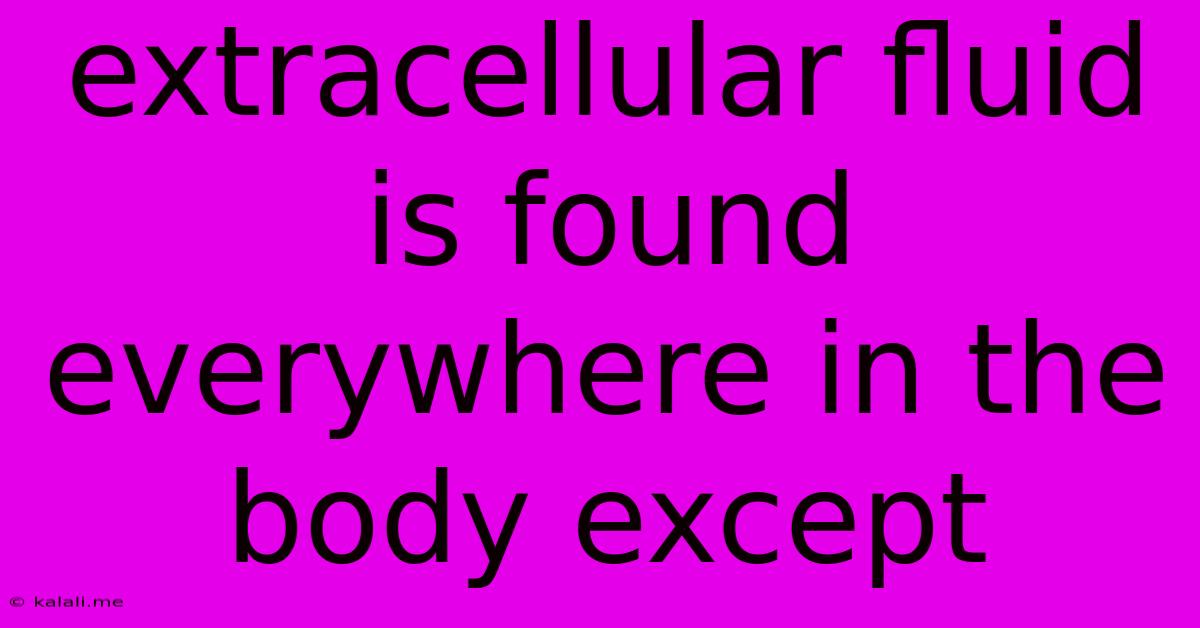Extracellular Fluid Is Found Everywhere In The Body Except
Kalali
Jun 15, 2025 · 2 min read

Table of Contents
Extracellular Fluid: Everywhere But Inside Your Cells
Extracellular fluid (ECF) is a crucial component of your body's internal environment, acting as a vital transport medium for nutrients, hormones, and waste products. Understanding its location and function is key to grasping human physiology. This article explores where ECF is found and, importantly, where it isn't. The simple answer is: extracellular fluid is found everywhere in the body except inside cells. Let's delve deeper into the specifics.
ECF bathes the cells, providing them with the resources they need and removing their byproducts. It's a dynamic system, constantly circulating and exchanging materials with the intracellular fluid (ICF) within cells. This constant exchange maintains homeostasis, the stable internal environment essential for life.
Where is Extracellular Fluid Located?
ECF is broadly divided into two main compartments:
-
Interstitial Fluid: This makes up the largest portion of ECF. It's the fluid that surrounds your cells, filling the spaces between them in tissues and organs. Think of it as the "sea" in which your cells reside. This fluid allows for the diffusion of nutrients and waste products between blood vessels and cells.
-
Plasma: This is the liquid component of your blood. It's the medium carrying blood cells (red blood cells, white blood cells, and platelets) throughout your circulatory system. Plasma transports oxygen, nutrients, hormones, and waste products to and from your cells. It's a critical part of ECF because of its role in this transport process. The exchange between plasma and interstitial fluid occurs across the thin walls of capillaries, the smallest blood vessels.
Other smaller compartments also contribute to the ECF volume:
-
Lymph: This fluid is collected from interstitial spaces and transported through lymphatic vessels. It plays an important role in the immune system and fluid balance.
-
Transcellular Fluid: This small compartment includes fluids within specialized body cavities, such as cerebrospinal fluid (CSF) surrounding the brain and spinal cord, synovial fluid in joints, and aqueous humor in the eyes.
The Importance of the Intracellular/Extracellular Fluid Distinction
The separation between intracellular and extracellular fluid is crucial for maintaining cellular function. Cell membranes are selectively permeable, controlling which substances can pass in and out. This control is vital for maintaining the correct balance of ions and other molecules inside the cell, which is different from the balance in the ECF.
Disruptions to this balance, such as dehydration or electrolyte imbalances, can have serious consequences on cellular function and overall health.
In Summary:
Extracellular fluid is a dynamic and essential part of your body's internal environment. It's found throughout your body in various compartments, including interstitial fluid, plasma, lymph, and transcellular fluid. However, it is critically important to remember that ECF is located everywhere except inside the cells themselves. The controlled exchange between ECF and ICF is fundamental to maintaining homeostasis and overall health. Understanding this distinction is key to understanding many physiological processes.
Latest Posts
Latest Posts
-
What Is The Theme Of This Passage
Jun 15, 2025
-
Difference Between Code Of Ethics And Code Of Conduct
Jun 15, 2025
-
Which Of The Following Statements Is True About Marketing Functions
Jun 15, 2025
-
Lcm Of 6 8 And 9
Jun 15, 2025
-
Bank Account Closure Request Letter Format
Jun 15, 2025
Related Post
Thank you for visiting our website which covers about Extracellular Fluid Is Found Everywhere In The Body Except . We hope the information provided has been useful to you. Feel free to contact us if you have any questions or need further assistance. See you next time and don't miss to bookmark.